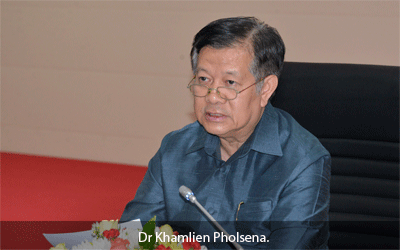Laos: SEZ management decree under scrutiny, aiming to draw more investors
The government is creating new decrees to ensure the sustainable development of Special Economic Zones (SEZs) in ways that yield strong benefits.
Special Economic Zones are economic development areas set up to attract large-scale investors, both Lao and foreign, to spur economic growth and create job opportunities for local people.
Government officials from central and provincial agencies yesterday gathered in Vientiane to discuss a draft decree on the promotion and management of SEZs.
Also up for discussion was a draft decision on the work of SEZ Management Committees that would ensure the directives contained in the Investment Promotion Law were effectively carried out.
These decrees are aimed at simplifying procedures for investors, making them faster, more transparent and fair, and ensuring that investors have confidence in the system and are not taken advantage of by the authorities, Deputy Minister of Planning and Investment Dr Khamlien Pholsena said.
The decrees would also help the management committees in each area to better promote and develop the areas under their responsibility. It was learnt that they had struggled in the past due to misunderstanding on the part of various sectors.
The draft decree on the promotion and management of SEZs comprises 13 chapters and 62 articles.
The decree has three parts: establishing and investing in Special Economic Zones, investment promotion policy for developers and investors, and organisational structure at the macro and micro levels.
Decisions concerning the allocation of specific areas to investors are also the responsibility of SEZ Management Committees.
SEZs were first established in Laos in 2002, starting with the Savan Seno Special Economic Zone (Savan Seno SEZ) which was the testing ground for this form of economic development, Dr Khamlien said.
Since then the number of SEZs in Laos has grown steadily, he added.
Laos currently has 12 SEZs covering more than 19,600 hectares. The value of investment has reached US$1.6 billion, of which US$24 million is invested by the government, US$1.27 billion by developers, and US$349 million by retail investors.
The total number of domestic and foreign companies is now 318 companies and businesses. Of these, 57 companies are privately owned Lao concerns, 239 companies are foreign owned, and 22 are joint ventures between Lao and foreign companies.
The service sector accounts for 40 percent of SEZ operations, 32 percent are industrial and 28 percent are commercial. Jobs have been created for about 15,544 people, of whom 7,180 are Lao nationals and 8,364 are foreign.
SEZs have yielded US$16 million for the national budget and it is expected this figure will more than double in the future as many factories have been built and some are now starting production.
Source: http://www.vientianetimes.org.la/FreeContent/FreeConten_SEZ.htm


 English
English




